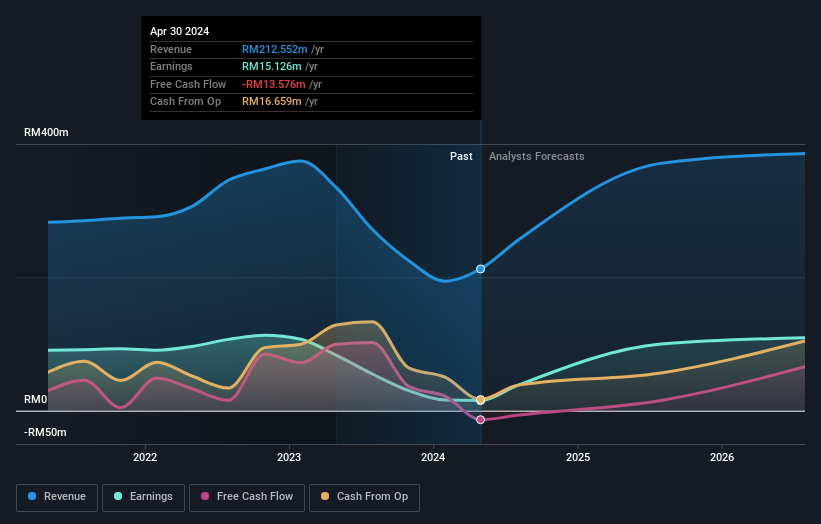After the recent decline, UWC Berhad (KLSE:UWC) CEO Chai Ng's holdings have lost 9.9% of their value

Key Insights
- Significant insider control over UWC Berhad implies vested interests in company growth
- 64% of the business is held by the top 2 shareholders
- Institutions own 22% of UWC Berhad
To get a sense of who is truly in control of UWC Berhad (KLSE:UWC), it is important to understand the ownership structure of the business. We can see that individual insiders own the lion's share in the company with 64% ownership. That is, the group stands to benefit the most if the stock rises (or lose the most if there is a downturn).
And following last week's 9.9% decline in share price, insiders suffered the most losses.
Let's delve deeper into each type of owner of UWC Berhad, beginning with the chart below.
See our latest analysis for UWC Berhad

What Does The Institutional Ownership Tell Us About UWC Berhad?
Institutions typically measure themselves against a benchmark when reporting to their own investors, so they often become more enthusiastic about a stock once it's included in a major index. We would expect most companies to have some institutions on the register, especially if they are growing.
We can see that UWC Berhad does have institutional investors; and they hold a good portion of the company's stock. This implies the analysts working for those institutions have looked at the stock and they like it. But just like anyone else, they could be wrong. It is not uncommon to see a big share price drop if two large institutional investors try to sell out of a stock at the same time. So it is worth checking the past earnings trajectory of UWC Berhad, (below). Of course, keep in mind that there are other factors to consider, too.

UWC Berhad is not owned by hedge funds. With a 32% stake, CEO Chai Ng is the largest shareholder. Chee Lau is the second largest shareholder owning 32% of common stock, and Employees Provident Fund of Malaysia holds about 8.3% of the company stock. Interestingly, the second-largest shareholder, Chee Lau is also Chief Operating Officer, again, pointing towards strong insider ownership amongst the company's top shareholders.
After doing some more digging, we found that the top 2 shareholders collectively control more than half of the company's shares, implying that they have considerable power to influence the company's decisions.
While studying institutional ownership for a company can add value to your research, it is also a good practice to research analyst recommendations to get a deeper understand of a stock's expected performance. Quite a few analysts cover the stock, so you could look into forecast growth quite easily.
Insider Ownership Of UWC Berhad
While the precise definition of an insider can be subjective, almost everyone considers board members to be insiders. Management ultimately answers to the board. However, it is not uncommon for managers to be executive board members, especially if they are a founder or the CEO.
I generally consider insider ownership to be a good thing. However, on some occasions it makes it more difficult for other shareholders to hold the board accountable for decisions.
Our information suggests that insiders own more than half of UWC Berhad. This gives them effective control of the company. Given it has a market cap of RM3.3b, that means they have RM2.1b worth of shares. It is good to see this level of investment. You can check here to see if those insiders have been buying recently.
General Public Ownership
With a 14% ownership, the general public, mostly comprising of individual investors, have some degree of sway over UWC Berhad. While this size of ownership may not be enough to sway a policy decision in their favour, they can still make a collective impact on company policies.
Next Steps:
It's always worth thinking about the different groups who own shares in a company. But to understand UWC Berhad better, we need to consider many other factors. To that end, you should be aware of the 1 warning sign we've spotted with UWC Berhad .
If you would prefer discover what analysts are predicting in terms of future growth, do not miss this free report on analyst forecasts.
NB: Figures in this article are calculated using data from the last twelve months, which refer to the 12-month period ending on the last date of the month the financial statement is dated. This may not be consistent with full year annual report figures.
New: AI Stock Screener & Alerts
Our new AI Stock Screener scans the market every day to uncover opportunities.
• Dividend Powerhouses (3%+ Yield)
• Undervalued Small Caps with Insider Buying
• High growth Tech and AI Companies
Or build your own from over 50 metrics.
Have feedback on this article? Concerned about the content? Get in touch with us directly. Alternatively, email editorial-team (at) simplywallst.com.
This article by Simply Wall St is general in nature. We provide commentary based on historical data and analyst forecasts only using an unbiased methodology and our articles are not intended to be financial advice. It does not constitute a recommendation to buy or sell any stock, and does not take account of your objectives, or your financial situation. We aim to bring you long-term focused analysis driven by fundamental data. Note that our analysis may not factor in the latest price-sensitive company announcements or qualitative material. Simply Wall St has no position in any stocks mentioned.
Have feedback on this article? Concerned about the content? Get in touch with us directly. Alternatively, email editorial-team@simplywallst.com
About KLSE:UWC
UWC Berhad
An investment holding company, engages in the provision of precision sheet metal fabrication, precision machined components, and value-added assembly services in Malaysia, the United States, Singapore, Thailand, India, France, the Netherlands, Australia, China, Canada, Denmark, Germany, Japan, Mexico, Spain, South Korea, and Vietnam.
Excellent balance sheet with reasonable growth potential.
Similar Companies
Market Insights
Community Narratives



